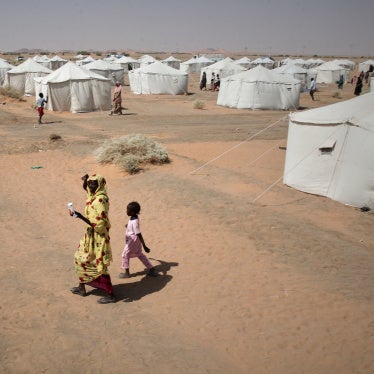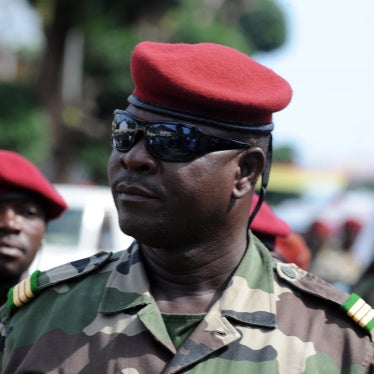(Brussels) – Ivorian authorities should promptly surrender Simone Gbagbo, wife of the former Ivorian President Laurent Gbagbo, to the International Criminal Court (ICC), Human Rights Watch said today. ICC judges ruled on December 11, 2014, that the court had the authority to hear the case against her. The ICC has charged Simone Gbagbo with four counts of crimes against humanity in relation to the deadly violence that followed Côte d’Ivoire’s 2010 presidential election.
The admissibility ruling, a standard step for each case, evaluates the case against criteria that must be satisfied before the ICC can take the case. They include whether charges brought against her in Côte d’Ivoire relate to substantially the same conduct as that charged by the ICC and, if so, whether the Ivorian authorities are willing and able to try the case.
“Despite improvements in rebuilding the country since the post-election crisis, today’s ruling highlights that Côte d’Ivoire still has much work to do when it comes to holding those suspected of the worst crimes to account,” said Param-Preet Singh, senior international justice counsel at Human Rights Watch. “Surrendering Simone Gbagbo to The Hague would show Côte d’Ivoire’s commitment to justice for victims of pro-Gbagbo forces.”
Internationally recognized results proclaimed the current president, Alassane Ouattara, the winner of the November 2010 election, but Laurent Gbagbo, his opponent, refused to step down as president. That caused a five-month crisis during which at least 3,000 people were killed and 150 women raped, with attacks often carried out along political, ethnic, and religious lines.
Simone Gbagbo has been under house arrest since April 2011, and the ICC issued a sealed arrest warrant against her in February 2012. In October 2013, in response to a request by the court’s judges for an answer to the warrant, Ivorian authorities formally challenged the admissibility of the case before the ICC, as she was being tried domestically for similar offenses. ICC judges in August 2014 sought more information about the case against her, which the Ivorian authorities provided in October.
In 2003, the Ivorian government under then-President Gbagbo submitted a declaration giving the ICC jurisdiction for events after September 19, 2002, which was reaffirmed by President Ouattara in 2010 and 2011. The ICC opened an investigation in October 2011. Côte d’Ivoire formally became a party to the Rome Statute, the ICC’s founding treaty, in 2013.
Ivorian authorities have charged Simone Gbagbo with both human rights crimes, including genocide, and crimes against the state. Her trial for the latter, together with more than 80 codefendants, was set to begin in October 2014, but was delayed after the initial appearance of the accused, in part because the defense needed more time to prepare.
In analyzing the documentation provided by the authorities of Côte d’Ivoire about allegations pursued against Simone Gbagbo before national courts, the ICC judges concluded that the crimes for which she is currently prosecuted are not the same as those included in the ICC case – killings, rapes, and acts causing great suffering or serious injury to individuals are not being considered. The judges further found that Simone Gbagbo was charged in 2012 with crimes similar to those contained in the ICC case but that the national judiciary was not taking concrete, tangible, and progressive steps to ascertain her criminal responsibility for these crimes. The decision can be appealed.
Earlier in 2014, the ICC confirmed four charges of crimes against humanity against Laurent Gbagbo, which means he will stand trial, presently scheduled to begin in July 2015. Charles Blé Goudé, a close ally and former minister in Gbagbo’s government, is in ICC custody too. ICC judges also decided on December 11, 2014, to confirm four charges of crimes against humanity against him and committed him to trial. The Office of the Prosecutor has flagged to the ICC’s judges that it would seek to join his trial with Laurent Gbagbo’s.
In June 2011, the Côte d’Ivoire government created a Special Investigative Cell to investigate and prosecute serious crimes committed during the post-election period, but there is a marked lack of overall progress in processing cases of serious crimes committed during the crisis. Obstacles noted by Human Rights Watch in a 2013 report remain largely unaddressed. These include the absence of protection for judges, prosecutors, and witnesses involved in sensitive cases, and the judiciary’s overall lack of independence.
The ICC has not pursued anyone from the forces that fought for President Ouattara, despite findings by both international and Ivorian commissions of inquiry that both sides committed war crimes and possible crimes against humanity. Ivorian authorities have similarly not pursued any member of President Ouattara’s Republican Forces implicated in crimes related to the crisis. The ICC prosecutor, Fatou Bensouda, has repeatedly emphasized her office’s impartiality and has said that investigations are ongoing.
“Côte d’Ivoire’s lack of progress in holding to account those accused of horrific post-election crimes on both sides highlights the critical role of the ICC in Côte d’Ivoire,” Singh said. “The ICC needs to extend its reach to the Ouattara side to change the status quo for justice in Côte d’Ivoire.”








